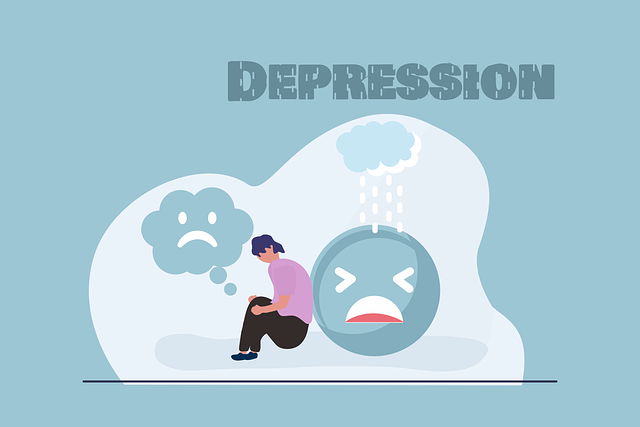Mental health crisis hotlines are vital resources offering immediate support and guidance during emotional crises, including therapy for adults with terminal illnesses. Staffed by trained professionals, these hotlines provide tailored assistance, mindfulness meditation techniques, and mental wellness coaching programs. Many also produce podcasts disseminating evidence-based mental health information. For terminally ill adults, specialized therapists offer grief counseling and end-of-life support, focusing on symptom management and self-care practices. Effective mental health policy advocacy ensures accessible support systems addressing both physical and mental health concerns through holistic care and open communication. These hotlines operate 24/7, breaking down stigmas and promoting early help-seeking for improved outcomes.
Mental health crisis hotline support services play a crucial role in empowering individuals facing acute distress. In this article, we explore various facets of these essential resources. From understanding mental health crises to the critical role of emergency support services, we delve into therapy options tailored for adults with terminal illnesses. We also provide practical guidance on accessing and utilizing these resources effectively. Additionally, we discuss the importance of training and awareness in empowering help-seekers. Discover valuable insights into therapy for adults with terminal illnesses and learn how crisis hotlines offer vital assistance during challenging times.
- Understanding Mental Health Crisis Hotlines
- The Role of Emergency Support Services
- Therapy Options for Adults with Terminal Illness
- How to Access and Utilize These Resources
- Training and Awareness: Empowering Help-Seekers
Understanding Mental Health Crisis Hotlines

Mental Health Crisis Hotlines are vital support services designed to offer immediate assistance and guidance during intense emotional distress or mental health emergencies. These hotlines provide a safe, confidential space for individuals to connect with trained professionals who can help navigate turbulent times. Staffed by experts in psychology, psychiatry, and counseling, these services offer a range of resources tailored to diverse needs. From crisis intervention to referral for therapy for adults terminal illness, mindfulness meditation techniques, and mental wellness coaching programs development, hotlines empower users to manage their mental health effectively. Furthermore, many hotlines also facilitate the production of mental wellness podcast series, providing accessible, evidence-based information to a wider audience, thereby fostering greater awareness and understanding of mental health issues.
The Role of Emergency Support Services

Emergency support services play a pivotal role in providing immediate assistance during mental health crises. These hotlines are designed to offer a safe space for individuals struggling with various issues, including those facing terminal illnesses and their accompanying emotional challenges. When faced with a crisis, accessing swift therapy for adults with terminal illness can be life-saving, offering much-needed support and guidance.
These services are instrumental in helping people develop coping skills to manage depression prevention and enhance their overall well-being. By providing a confidential and non-judgmental environment, hotlines encourage individuals to express their feelings openly, fostering a sense of understanding and empowerment. The role of emergency support extends beyond immediate intervention; it also serves as a vital resource for building resilience and confidence-boosting strategies, ensuring individuals are better equipped to navigate future challenges.
Therapy Options for Adults with Terminal Illness

For adults facing a terminal illness, finding appropriate therapy options is essential for managing both emotional distress and improving overall quality of life. Beyond coping with the physical aspects of their condition, individuals can benefit from specialized support tailored to address psychological challenges unique to this situation. One effective approach involves psychotherapy, which enables patients to express their feelings, fears, and concerns in a safe and non-judgmental environment. Therapists skilled in grief counseling or end-of-life support can help individuals process their emotions, navigate existential questions, and enhance communication strategies with loved ones.
Incorporating depression prevention techniques is also vital within this therapeutic framework. Many terminally ill adults experience depression as a natural response to their circumstances. Through therapy, they can learn coping mechanisms to manage symptoms, improve mood regulation, and maintain a sense of hope. Additionally, mental health policy analysis and advocacy play a crucial role in ensuring accessible and comprehensive support systems for these individuals. Effective communication strategies among healthcare providers, patients, and families are essential for delivering holistic care that addresses both physical and mental health concerns.
How to Access and Utilize These Resources

Accessing mental health crisis hotline support services is a straightforward process designed to ensure immediate assistance when needed. These hotlines are typically available 24/7, offering confidential and free consultations. Individuals in distress can simply dial the dedicated number, often provided by local authorities or non-profit organizations, to connect with trained professionals. The hotline staff are equipped to handle a range of issues, including anxiety relief, depression, grief, and even those seeking therapy for adults terminal illness. They provide an initial assessment, offer guidance, and direct callers to the most suitable support, whether that’s crisis intervention, counseling services, or social skills training.
Utilizing these resources is as simple as staying calm and being honest about your feelings during the call. Sharing details about your emotional state allows the hotline operator to connect you with specialized services. Regular use of such hotlines can also raise public awareness campaigns development, breaking down mental health-related stigmas. Remember, seeking help is a sign of strength, and these services are there to support individuals in navigating through challenging times.
Training and Awareness: Empowering Help-Seekers

The effectiveness of mental health crisis hotline support services significantly relies on the training and awareness of those providing assistance. Professionals are equipped with specialized skills to handle a range of concerns, including those faced by individuals dealing with terminal illnesses. Therapists trained in grief and end-of-life care can offer much-needed emotional support while guiding patients through their journey. This specialized therapy for adults facing terminal illnesses focuses on not just managing symptoms but also fostering self-care practices and stress reduction methods.
By raising awareness about these services, more people will be empowered to seek help when needed. Encouraging open conversations about mental health can lead to earlier interventions and improved outcomes. Through training, hotline operators become adept at recognizing signs of distress and providing immediate assistance, which is crucial for those battling illness. This holistic approach not only addresses the symptoms but also supports the development of inner strength, enabling individuals to cope more effectively during challenging times.
Mental health crisis hotlines play a vital role in providing immediate support and navigation through emergency services. By offering confidential and accessible resources, these hotlines empower individuals facing mental health crises, especially those grappling with terminal illnesses. As discussed, various therapy options tailored for adults with terminal conditions can significantly enhance quality of life. Understanding how to access these services is crucial, and increasing awareness through training empowers people to seek help proactively. Remember that, in times of crisis, these hotlines serve as a lifeline, offering not just temporary relief but also guidance towards long-term well-being, including exploring Therapy for Adults Terminal Illness options.








